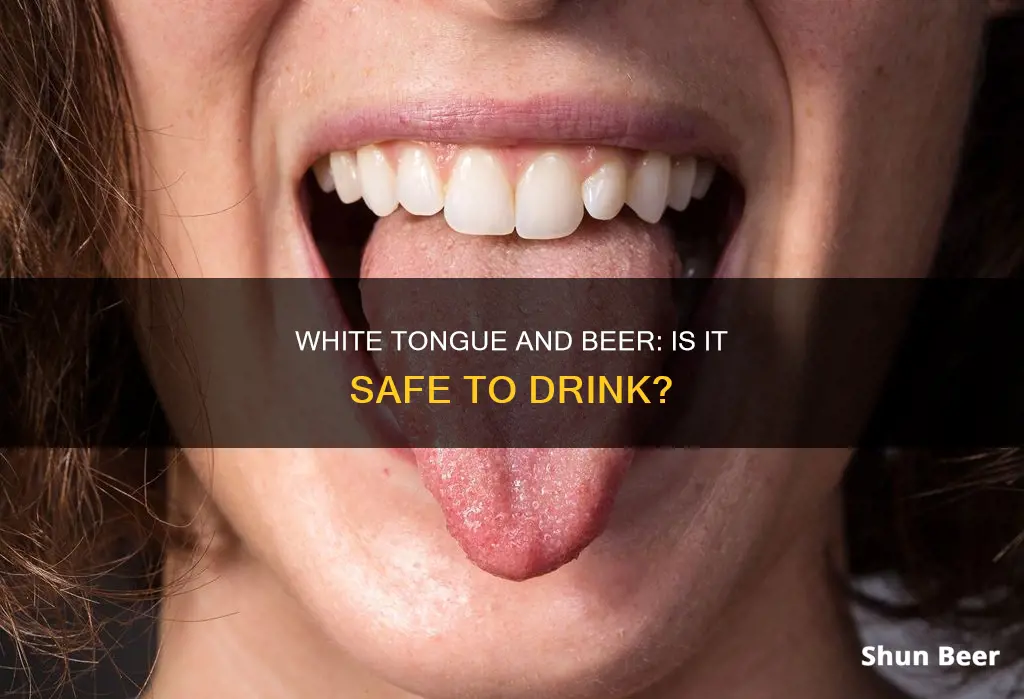
A white tongue is usually harmless and may be caused by inflammation of the papillae, the small bumps on the tongue, which can become swollen and inflamed, trapping debris, bacteria, and dead cells. This condition is often the result of poor oral hygiene, dehydration, dry mouth, tobacco use, or excessive alcohol consumption. While it usually clears up on its own, it is recommended to consult a doctor if the white coating persists for a couple of weeks or is accompanied by other symptoms such as pain, sores in the mouth, or difficulty chewing and swallowing. To prevent and treat a white tongue, maintaining good oral hygiene practices, staying hydrated, and reducing alcohol consumption are key.
Characteristics of White Tongue
| Characteristics | Values |
|---|---|
| Causes | Poor oral hygiene, dehydration, tobacco use, alcohol use, dry mouth, infection, leukoplakia, oral lichen planus, oral thrush, syphilis, mouth cancer, tongue cancer, medication side effects, underlying health conditions |
| Appearance | White coating or patches on the tongue, which may be thick and unable to be scraped off |
| Treatment | Depends on the cause; may include improving oral hygiene, reducing alcohol consumption, stopping smoking, drinking water, antifungal or antibiotic medication, corticosteroids |
| When to see a doctor | If the white tongue does not go away in a couple of weeks, or if there are other symptoms such as pain, open sores in the mouth, difficulty chewing, swallowing or talking, fever, weight loss, or skin rash |
| Prevention | Practicing good oral hygiene, avoiding tobacco and alcohol, eating a healthy diet with fresh fruits and vegetables |
| Relation to alcohol consumption | Alcohol can cause dry mouth, which is a risk factor for white tongue |
What You'll Learn

Drinking beer and dehydration
A white tongue is usually harmless and temporary. It is often caused by debris, bacteria, and dead cells getting lodged between inflamed papillae (small bumps) on the tongue. This inflammation can be caused by poor oral hygiene, dehydration, tobacco use, dry mouth, excessive alcohol use, fever, or smoking. In rare cases, a white tongue can indicate a more serious underlying condition, such as oral thrush, leukoplakia, oral lichen planus, or even early cancer.
Drinking beer, especially in excess, can contribute to dehydration, which can lead to a white tongue. Beer is a diuretic, which means it increases urine production and can lead to fluid loss. Alcohol also inhibits the production of vasopressin, an antidiuretic hormone that helps the body retain water. This can further contribute to dehydration. Additionally, the irritants and toxins in alcohol can irritate the mouth and tongue, leading to inflammation.
To prevent dehydration and reduce the risk of a white tongue, it is important to stay adequately hydrated, especially when consuming alcohol. This means drinking plenty of water along with alcoholic beverages and after a night of drinking. It is also crucial to practice good oral hygiene, including brushing and flossing regularly, and reducing alcohol and tobacco consumption.
While the belief that alcohol causes dehydration is widespread, some scientific research suggests that it may not be as significant as commonly believed. One study found that while an initial drink may cause a slight increase in urine output compared to drinking water, subsequent drinks do not lead to further increases in urine output. However, it is still important to stay hydrated and practice moderation when consuming alcohol to minimize potential negative effects on the body.
Ash Wednesday: Beer Drinking and Religious Observance
You may want to see also

Alcohol and dry mouth
Alcohol consumption can lead to a dry mouth or xerostomia, which is a common condition. Even moderate drinking can affect oral health and salivary flow rate, causing a decrease in saliva secretion and resulting in dry mouth.
Causes of Alcohol-Induced Dry Mouth
Alcohol acts as a diuretic, which means that your body experiences a decrease in body fluid volume due to increased urination. This can lead to dehydration and a dry mouth. In addition, alcohol can also cause a decrease in salivary secretion, which can further contribute to dry mouth.
Effects of Alcohol-Induced Dry Mouth on Oral Health
Dry mouth can have several negative effects on oral health:
- Difficulty chewing and swallowing, which can result in poor nutrition
- Increase in plaque buildup, tooth decay, and gum disease
- Mouth sores or sores at the corners of the mouth
- Yeast infection in the mouth (thrush)
Preventing and Treating Alcohol-Induced Dry Mouth
If you experience dry mouth after drinking alcohol, there are some things you can do to prevent and treat it:
- Drink a glass of water between alcoholic beverages.
- Be mindful of the sugar content in your drinks.
- Chew xylitol gum or suck on sugar-free hard candy to stimulate saliva flow.
- Use a mouth-moistening spray or alcohol-free mouthwash.
- Brush and rinse with elevated pH products.
- Drink lots of water the next day.
Beer and Ciprofloxacin: Is It Safe to Mix?
You may want to see also

Oral thrush and drinking beer
Oral thrush is a fungal infection of Candida yeast. It is usually treated with antifungal medication, which is applied to the mouth for 1 to 2 weeks. In more severe cases, a healthcare professional may prescribe oral or intravenous medication.
Drinking alcohol, including beer, can increase your risk of developing oral thrush. This is because alcohol weakens the immune system, making it harder for your body to fight off infections like oral thrush. Alcohol can also overload your liver, which is responsible for processing and eliminating toxins from your body, including those produced by Candida yeast.
In addition to alcohol, other risk factors for oral thrush include diabetes, a weakened immune system (e.g. from HIV or AIDS), iron or vitamin B deficiency, and wearing dentures.
If you are currently being treated for oral thrush, it is recommended to avoid drinking beer or other alcoholic beverages to help your body recover. However, once you have recovered, small amounts of alcohol are considered okay as part of a low-sugar, balanced diet.
It is important to note that while alcohol can increase your risk of oral thrush, it is not the only factor. Poor oral hygiene is a common cause of oral thrush, as it allows bacteria, fungi, dirt, food, and dead cells to get trapped and build up on the tongue, leading to a white coating.
Therefore, to reduce your risk of oral thrush, it is recommended to practice good oral hygiene, including brushing your teeth twice a day, using a tongue scraper or soft-bristled toothbrush to clean your tongue, and seeing your dentist regularly for check-ups and cleanings.
Hoppy Beers: The Secret to Better Beer Bread?
You may want to see also

Leukoplakia and drinking beer
A white tongue is usually harmless and may be caused by poor oral hygiene, dehydration, dry mouth, tobacco use, or infection. However, in rare cases, it could be a symptom of a more serious condition such as leukoplakia, oral thrush, or even early cancer.
Leukoplakia is a condition that causes cells in the mouth to grow excessively, leading to the formation of white patches that cannot be scraped off. While these patches are usually harmless, leukoplakia can develop into oral cancer in rare cases. Excessive alcohol consumption and tobacco use are known risk factors for leukoplakia.
If you are experiencing a white tongue along with other symptoms such as pain, open sores in the mouth, or difficulty chewing, swallowing, or talking, it is recommended to consult a doctor or dentist. They can help diagnose the underlying cause and provide appropriate treatment or advice.
To reduce the risk of developing leukoplakia and other oral health issues, it is advisable to practice good oral hygiene, avoid tobacco products, and reduce alcohol consumption. This includes brushing your teeth twice a day, using a soft-bristled toothbrush, flossing at least once a day, and visiting your dentist regularly for check-ups and cleanings.
Beer and Zyrtec: A Safe Mix?
You may want to see also

Oral lichen planus and drinking beer
A white tongue can be caused by a variety of factors, including poor oral hygiene, dehydration, tobacco use, and infection. One possible cause of a white tongue is oral lichen planus, an autoimmune disorder that affects the mouth and tongue, causing white, lacy patches of skin, pain, soreness, and swelling.
Regarding the consumption of beer and other alcoholic beverages, there are a few considerations for individuals with oral lichen planus:
- Impact on oral lichen planus symptoms — Alcoholic beverages, including beer, can irritate the mouth and trigger symptoms of oral lichen planus. Caffeinated beverages and spicy, acidic, and citrus foods and drinks can also aggravate the condition.
- Potential risk of oral cancer — Oral lichen planus is associated with a slightly elevated risk of developing oral cancer. As alcohol consumption is an independent risk factor for oral cancer and premalignant lesions, it is generally recommended to avoid or at least moderate alcohol intake to reduce this risk.
- Effect on the immune system — Oral lichen planus is an autoimmune disease, and ethanol consumption (including beer) is known to suppress the immune system. While chronic ethanol consumption may decrease the incidence of oral lichen planus, excessive alcohol consumption can increase the risk of many other diseases.
In summary, while moderate beer consumption may not directly worsen oral lichen planus symptoms, it is generally advisable for individuals with this condition to minimize or avoid alcohol consumption due to the elevated risk of oral cancer and potential immune system impacts. It is important to note that the decision to consume beer or other alcoholic beverages should be made in consultation with a healthcare professional, who can provide personalized advice based on an individual's specific circumstances.
Beer and Hernia: What You Need to Know
You may want to see also
Frequently asked questions
It is not recommended to drink beer or any other alcoholic beverage if you have a white tongue, as alcohol is a common cause of the condition.
A white tongue is usually caused by poor oral hygiene, allowing bacteria, food particles, and dead cells to get trapped between the papillae, the small bumps on the tongue. Other common causes include dehydration, dry mouth, tobacco use, and infection.
To get rid of a white tongue, it is recommended to practice good oral hygiene, including gently brushing the tongue with a soft-bristled toothbrush or using a tongue scraper. Staying hydrated and reducing alcohol and tobacco consumption can also help.
While a white tongue is usually harmless and clears up on its own, it is recommended to see a doctor if the condition does not improve within two weeks or if there are other concerning symptoms, such as pain, open sores in the mouth, or difficulty chewing, swallowing, or talking.







